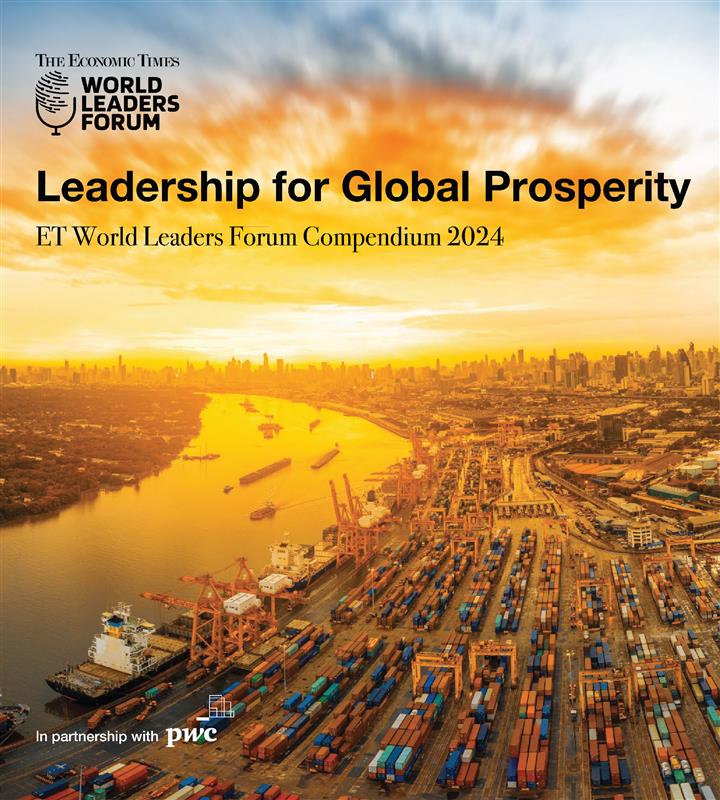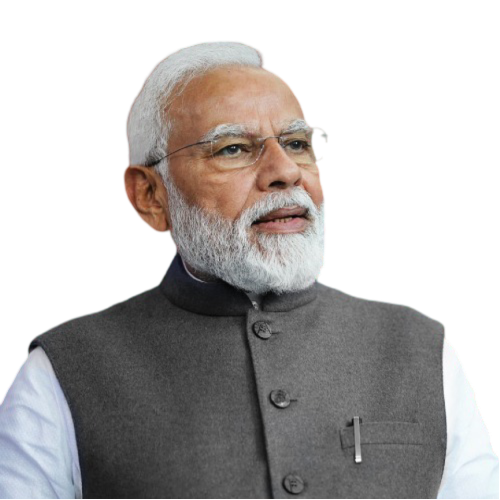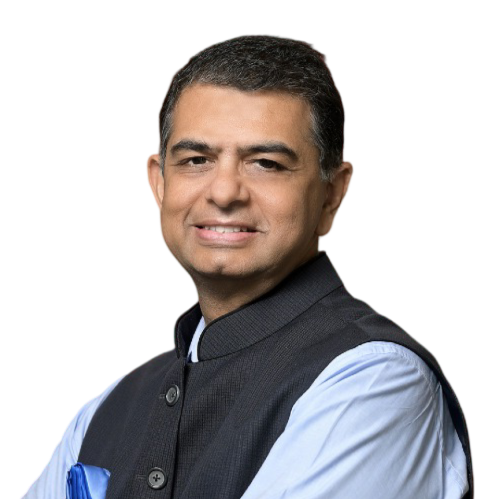Narendra Modi
Prime Minister of India


By taking action today, we can not only influence but also lead tomorrow. Responsible and innovative steps for collective good can help create the future. That implies communities the world over are empowered to influence their circumstances by taking initiatives and setting goals. It also underscores the responsibility to embrace new ideas, and develop solutions to current challenges - climate change, geopolitical conflict, economic disparities, and macroeconomic headwinds. This in turn highlights the importance of strategic planning anticipating possible disruptions. It also entails adaptability, being open to fail fast, learn fast and improve fast - of much relevance to the business world today.

Narendra Modi
Prime Minister of India
Sanjeev Krishan
Chairperson, PwC in India

Narendra Modi
Prime Minister of India
Bharat is crafting a unique success story today. The impact of our reforms is evident in the performance of our economy. In fact, Bharat has often outperformed predictions and its peers. For instance, in the past ten years, the global economy has grown by 35%. However, during the same period, our economy has expanded by nearly 90%. This is the sustained growth we have achieved, the sustained growth we promise, and the sustained growth that will continue into the future.
Today, Bharat’s progress is making global headlines. The key to Bharat’s future lies in this transformation. Over the past decade, 25 crore people have been lifted out of poverty. Not only have these individuals emerged from poverty, but they have also formed a neo-middle class. The speed and scale of this transformation are unprecedented in any democratic society worldwide.
When the election results were announced, I had said that during our third term, the government would work at three times the pace. I assure you, our resolve has only strengthened. Over the past three months, we have made significant decisions for the benefit of the poor, farmers, youth, and women. We have sanctioned 3 crore new houses for the poor, announced Unified Pension Scheme, expanded Agricultural Infrastructure Fund to INR 1 lakh crore, released over 100 varieties of improved seeds, and launched a PM package worth INR 2 lakh crore, directly benefiting more than 4 crore young people. Additionally, within just 100 days, 11 lakh rural women from ordinary families have become ‘lakhpati didis’ — a remarkable achievement in advancing the economic empowerment of women.
We have approved the construction of 12 new industrial cities with an investment of INR 30,000 crore. Moreover, eight high-speed corridors worth over INR 50,000 crore have been sanctioned. We have also approved the expansion of the Pune, Thane, and Bangalore Metro systems with INR 30,000 crore. Meanwhile, work has begun on one of the world’s highest tunnels in Ladakh. For us, infrastructure is more than just increasing length, breadth, and height — it is a means of improving convenience and the quality of life for Indian citizens.
The aspiration of every Indian is to see Bharat become a global manufacturing hub, and this is also the expectation the world has of us. Today, you can witness a revolution taking place across the country towards this goal. Our MSMEs are receiving an unprecedented level of support. Plug-and-play industrial parks are being established in cities, and economic corridors are being developed. The production of critical minerals is being actively promoted. The success of Production-Linked Incentive (PLI) schemes in Bharat has been nothing short of remarkable.
The green energy sector is poised to be another strong pillar of a developed Bharat. You have witnessed Bharat’s success at the G-20 summit, where our green hydrogen initiative garnered the support of all participating countries. Bharat has committed to developing the capacity to produce 5 million tonnes of green hydrogen by 2030. Additionally, Bharat aims to generate 500 gigawatts of renewable energy by 2030.
In the past years, technology has been a major driver of our growth. Now, alongside technology, tourism will also become a key pillar of Bharat’s development. The nation is striving to position itself as a top destination for tourists from all over the world, across various segments.
We have pledged to make Bharat a developed nation by 2047. We know that you also wish to actively participate in this journey. We want more and more companies in Bharat to become global brands. We aspire for Bharat to lead in every sector on the global stage.Think big, as we have many success stories to write together for the nation. Today’s Bharat is the land of the greatest possibilities in the world. Today’s Bharat values wealth creators.
A strong Bharat can drive substantial development for all of humanity. A prosperous Bharat can pave the way for global prosperity. We must remember the mantras of innovation, inclusion, and international cooperation. Let us make Bharat a developed nation because the prosperity of the world is intertwined with the prosperity of Bharat. And I am confident that we can achieve this goal. With this belief, I extend my heartfelt gratitude to all of you.
Our promise to you is that we will facilitate, and your promise should be to innovate.
Our promise is to reform, and your promise should be to perform.
Our promise is to provide a stable policy regime, and your promise should be to create positive disruptions.
Our promise is to focus on high growth, and your promise should be to focus on high quality
India is set to be one of the global superpowers soon – notwithstanding a polycrisis that has enveloped the world at large. That was the common refrain at the inaugural edition of The Economic Times World Leaders Forum held in New Delhi on 31 August, 2024. The event titled Leadership for global prosperity saw India’s Prime Minister Narendra Modi deliver the keynote address. It also had a few cabinet ministers and a host of global business leaders, thought leaders and influencers from different walks of life present their perspectives on a range of themes, with smart technologies layering progress in each domain.
There is no doubt that India is at an inflection point - defined by its relentless drive, steadfast resilience, and unwavering determination. Its journey from rapid growth to extraordinary progress has set the stage for a transformative leap forward. The nation is poised to grow from the world’s fifth largest economy in FY24 to the third largest by FY27, positioning itself as one of the foremost contributors to global growth in the coming years. The growth from ~USD 470 billion economy at the turn of the century to nearly USD 3.7 trillion today is a testament to the resilience, skills and entrepreneurialism within India, as well as the growing confidence from investors across the world.
In the wake of global disruptions, India’s allure as a key player in the global supply chain has never been stronger. India’s trade agreements, including a recent free trade pact with the European Free Trade Association, underscore its expanding global trade footprint and its strategic position in the global economy.
The digital revolution is another arena where India is making an indelible mark. Through cutting-edge technologies such as artificial intelligence, big data, and the Internet of Things, India is reshaping industries and driving efficiency. Government initiatives like Aadhaar, the Unified Payments Interface, and the Open Network for Digital Commerce are not just technological feats but cornerstones of a digital public infrastructure that supports and expands access to opportunities.
With exposure to global markets, technologies and processes, India is now focused on the development of a global workforce. As a witness to the transformative power of technology, especially through the democratised access provided by the India Stack, this workforce is uniquely positioned to build tech–first solutions. With their deep understanding of both local and global challenges, Indian professionals are at the forefront of developing innovative, tech-first solutions that are scalable and impactful. As the world increasingly looks to technology for sustainable growth, the Indian workforce is set to play a pivotal role in building solutions that are relevant, affordable, and globally applicable.
India’s demographics and diversity are creating a rich consumer market with a wide array of demands, segments, and requirements, allowing domestic and international firms to develop highly customised offerings while achieving sufficient scale for profitability. This dynamic environment has also fostered a unique entrepreneurial landscape characterised by a blend of creativity and resourcefulness, where innovation thrives on frugality. The ‘jugaad’ mindset has enabled Indian innovators to create cost-effective solutions without compromising on quality.
Since the emergence of India’s first unicorn in 2011, the country has rapidly evolved into an innovation hub with over 117 unicorns and a combined valuation of approximately USD 353 billion. Nearly 45% of startups originate from Tier 2 and 3 cities, developing practical solutions and invigorating local economies. This shift reflects a broader transformation among India’s youth from job seekers to job creators, with around 117,000 startups generating 1.2 million direct jobs. The rise in self-employment, growing from 52% in FY18 to 57% in FY23, further underscores the significant changes in the country’s employment landscape.
Talking of frugal innovation, another historic milestone was achieved in August 2023, as Chandrayaan-3, an indigenously developed spacecraft, became the first to successfully land on the Moon’s south pole. This feat, accomplished on a budget of INR 6 billion (~USD 74 million) —was made possible by a deep understanding of science, simplicity in design, and a focus on domestic procurement. This success exemplifies India’s knack for resource-efficient innovation, a quality that extends beyond space exploration to broader national priorities.
As the world pivots towards sustainability, India has positioned itself at the forefront of this crucial transition. With one of the largest renewable energy capacities in the world, and innovative schemes like the Green Credit Programme, India is leading by example in balancing economic development with environmental stewardship. This dedication to a green future is a cornerstone of India’s strategy to foster a more sustainable world.
All these developments have been empowered by regulatory and policy support, including improving the ease of doing business, reducing compliance burdens, alleviating logistical and infrastructural bottlenecks, supporting meaningful skill development, and enabling easy credit for entrepreneurs and MSMEs. Initiatives such as Make in India, Production-Linked Incentive schemes, and the India Stack, coupled with competitive federalism, are expected to meet local demands and cater to India’s diversity. The synergy between manufacturing and services is creating an inclusive growth ecosystem, driving job creation and economic expansion.
With India poised for multifaceted growth, all stakeholders must work concertedly to ensure that sustainability and inclusivity underpin India’s growth journey. While India has made significant progress, it is not immune to broader disruptions, including inequality, climate change, and increasing geopolitical conflicts.
The India growth narrative is both inspiring and promising. The country’s resilience, innovative spirit, and inclusive vision position it as a pivotal player in driving global prosperity. Reflecting on the insights from this year’s The Economic Times World Leaders Forum, we are reminded of the limitless potential that lies ahead. This book celebrates India’s progress as much as its potential, alongside global advancements, for a sustainable and prosperous tomorrow. It also outlines seven strides the country could take to lead by example and successfully navigate the future. We hope you find it engaging and informative. Read on for an immersive experience.

Sanjeev Krishan
Chairperson, PwC in India
Challenges have been manifold. The pandemic and healthcare crises, high inflation, geopolitical disruptions, cyberattacks, and extreme weather events have resulted in crises that India has turned into opportunities, enhancing its relevance as a global leader capable of rising to the occasion and leading by example.
Social and financial inclusion are imperative for a prosperous Bharat. Significant measures have been taken on that front, delivered on the back of digital technologies, yielding perceptible results at scale for all strata of society in India and elsewhere. People at the bottom rung of the social ladder are now conducting digital transactions from their bank accounts. Those who were excluded from the banking system are now obtaining bank loans without collateral guarantees and are becoming entrepreneurs.
Challenges have been manifold. The pandemic and healthcare crises, high inflation, geopolitical disruptions, cyberattacks, and extreme weather events have resulted in crises that India has turned into opportunities, enhancing its relevance as a global leader capable of rising to the occasion and leading by example.
Social and financial inclusion are imperative for a prosperous Bharat. Significant measures have been taken on that front, delivered on the back of digital technologies, yielding perceptible results at scale for all strata of society in India and elsewhere. People at the bottom rung of the social ladder are now conducting digital transactions from their bank accounts. Those who were excluded from the banking system are now obtaining bank loans without collateral guarantees and are becoming entrepreneurs.